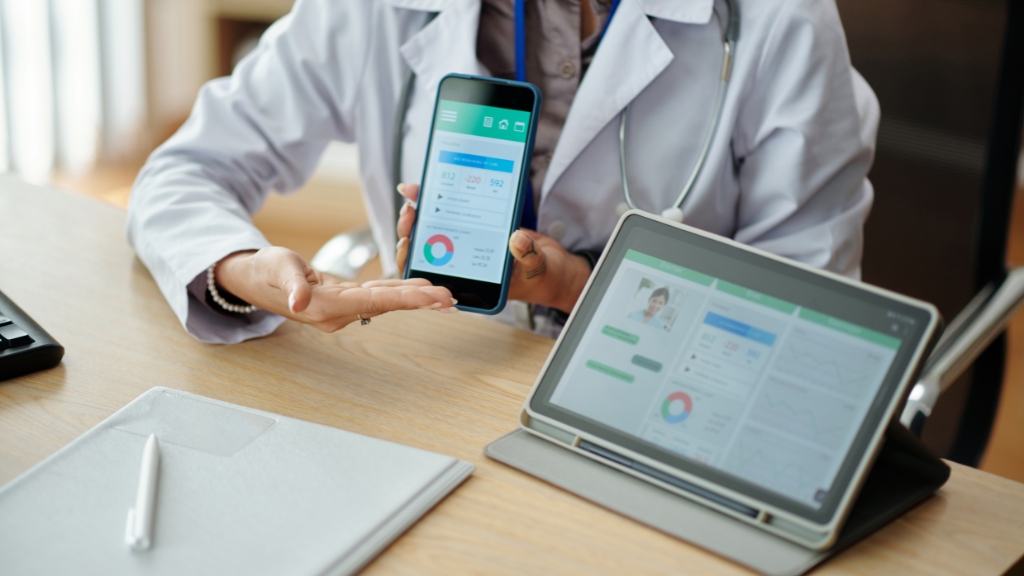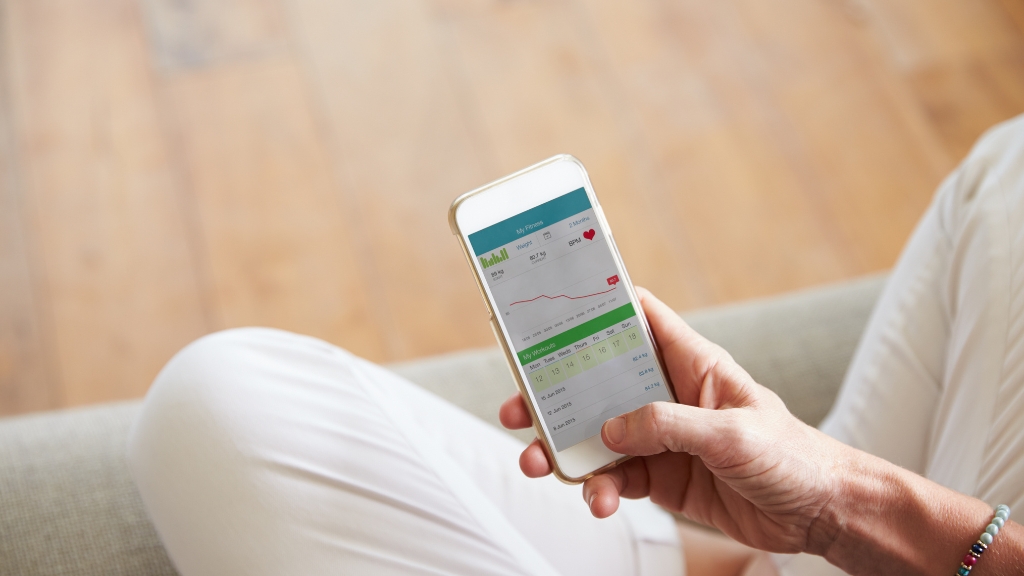
Revolutionizing Healthcare: The Rise of Mobile Health Apps
In recent years, mobile health apps have grown exponentially. Over 350,000 health-related apps are now available, with new ones entering the market every day. These apps cater to various health needs, including chronic disease management, fitness and wellness tracking, mental health support, and medication adherence. With the global focus on improving healthcare delivery and lowering costs, mHealth apps have emerged as powerful tools for healthcare providers and patients.
Why Mobile Health Apps Are So Popular:
- Accessibility
- With a smartphone, people can access various health resources anytime, anywhere. This makes healthcare accessible to people in remote or underserved areas where traditional healthcare infrastructure may be limited.
- Real-Time Health Monitoring
- Many mHealth apps allow users to monitor real-time vital signs, like heart rate, blood pressure, and glucose levels. This helps users and healthcare providers track progress and intervene promptly if something goes off track.
- Personalized Care
- Apps can be tailored to individual needs, offering personalized health insights, reminders for medication, and customized fitness plans that cater to users’ specific conditions or goals.
- Cost Efficiency
- By reducing the need for frequent clinic visits and encouraging preventative care, mobile health apps help cut healthcare costs for patients and providers.
Critical Types of Mobile Health Apps and Their Impact
Mobile health apps serve a variety of purposes in healthcare. Here are some of the main types and their impact on improving health outcomes:
- Chronic Disease Management Apps
- These apps help individuals with chronic conditions like diabetes, hypertension, and asthma to manage their health more effectively. Users can log daily health data, track symptoms, and access medication reminders, making it easier to adhere to treatment plans.
- Fitness and Wellness Apps
- With fitness trackers and workout apps, users can monitor their physical activity, set health goals, and track progress over time. These apps play an essential role in preventative healthcare by encouraging healthier lifestyle choices.
- Mental Health and Wellness Apps
- Mental health apps, like meditation or therapy platforms, support users in managing stress, anxiety, and depression. They offer resources like guided meditation, cognitive behavioral therapy exercises, access to licensed therapists, and valuable mental wellness tools.
- Medication Management Apps
- Forgetting medication can be costly and dangerous, especially for those with chronic conditions. Medication management apps send reminders, track doses, and notify caregivers or family members if a dose is missed, helping users stay consistent with their treatment.
- Telemedicine Apps
- These apps allow patients to consult with healthcare providers remotely. Video consultations, Text messaging with doctors, and sharing medical records through secure platforms help patients access medical advice without physically visiting a clinic.
Advantages of Mobile Health Apps in Healthcare
The benefits of mHealth apps are extensive, benefiting patients, providers, and the healthcare industry as a whole.
- Enhanced Patient Engagement
- Mobile health apps encourage patients to take an active role in their health. Patients are more engaged and informed about their health decisions by providing tools for self-monitoring, education, and access to care.
- Data-Driven Decisions
- Many health apps collect valuable data over time. With patient consent, this data can be shared with healthcare providers, allowing them to make more informed decisions based on real-world evidence.
- Improved Patient Outcomes
- When patients can monitor their health regularly and receive real-time feedback, they are more likely to follow treatment recommendations, manage conditions effectively, and prevent complications.
- Convenience and Efficiency
- Mobile apps eliminate the need for frequent in-person visits, saving time for both patients and providers. They enable seamless communication and reduce waiting times, especially for follow-up appointments and non-urgent consultations.
- Early Detection and Prevention
- With tracking and reminders, health apps can alert users to early symptoms or signs of deterioration. This early intervention capability can prevent the progression of illnesses and facilitate timely medical attention.
Challenges in Mobile Health App Development and Usage
Despite their advantages, mobile health apps face challenges that can affect their effectiveness and user adoption:
- Data Privacy and Security
- Health data is sensitive, and protecting it is crucial. Ensuring that apps comply with regulations like HIPAA (Health Insurance Portability and Accountability Act) and implementing strong encryption measures is essential for user trust.
- User Compliance
- For mHealth apps to be effective, users must engage consistently. App developers must create user-friendly, motivating interfaces accessible to all age groups, including elderly users who may not be tech-savvy.
- Accuracy and Reliability
- Not all health apps undergo rigorous testing. Poor-quality apps can provide inaccurate data, which could potentially harm users. Users need to choose apps from reputable developers and, when in doubt, consult healthcare providers.
- Integration with Healthcare Systems
- For mHealth apps to be fully effective, they should integrate seamlessly with healthcare systems, allowing providers to access app-generated data within electronic health records (EHRs) for a comprehensive view of patient health.
- Regulatory Compliance
- Many mHealth apps face regulatory hurdles as the industry grows. Compliance with FDA regulations and other health authorities can be challenging for app developers, especially as these rules evolve.
The Future of Mobile Health Apps in Healthcare
As technology continues to evolve, the role of mobile health apps in healthcare will likely expand. Emerging trends include:
- AI and Machine Learning Integration
- By incorporating AI, health apps can offer more accurate insights, predict health risks, and deliver personalized recommendations based on user data patterns.
- Wearable Integration
- Integration with wearables like smartwatches allows for real-time monitoring of vital signs, offering a more comprehensive health picture that enhances the app’s functionality.
- Improved Interoperability
- As healthcare systems move toward interoperability, we’ll likely see better data-sharing capabilities between apps, wearables, and electronic health records, creating a seamless patient experience.
- Virtual Reality and Augmented Reality
- Some apps are beginning to explore VR and AR technologies for therapy, fitness training, and even surgery simulations, pushing the boundaries of what mHealth apps can offer.
FAQs
Q: Are mobile health apps safe to use?
A: Yes, when chosen carefully. Look for apps from reputable developers and those that adhere to data protection regulations, such as HIPAA, in the US.
Q: Can health apps replace regular doctor visits?
A: While health apps are convenient, they don’t replace in-person visits for complex issues. Apps are best used as a supplement to traditional healthcare.
Q: Do health apps work with wearables?
A: Many health apps are compatible with wearables, allowing for continuous monitoring of vital signs and activity levels, which enhances their usefulness.
Q: Are mobile health apps suitable for everyone?
A: Most apps are designed to be accessible, but people with specific health conditions should consult a healthcare provider before using them for health management.
Leave a Reply
- AI in Diagnostics: Revolutionizing Early Detection and Accuracy
- How AI and Advanced Analytics Are Transforming Healthcare Outcomes
- Investing with Confidence: The Role of ROI Calculators
- How ROI Calculators Drive Data-Driven Business Strategies
- The Ultimate Guide to ROI Calculators for Business Success
- Making Sense of ROI Calculators: A Comprehensive Guide
- June 2025 (1)
- May 2025 (1)
- October 2024 (2)
- September 2024 (31)
- August 2024 (31)
- July 2024 (27)
- June 2024 (28)
- May 2024 (30)
- April 2024 (33)
- March 2024 (23)
- February 2024 (29)
- January 2024 (3)
- December 2023 (47)
- November 2023 (36)
- October 2023 (23)
- September 2023 (2)
- June 2023 (2)
- May 2023 (13)
- April 2023 (1)




